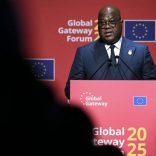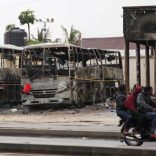TotalEnergies' Tanzania pipeline project cost climbs to $5.6B - report
Zimbabwe party loses bid to block Mugabe-era massacre hearings

FILE - A portrait of former president of Zimbabwe, Robert Mugabe hangs on the wall at the Zimbabwe African National Union – Patriotic Front’s (ZANU-PF) conference hall in Harare, on 25 August 2023. [File photo: John Wessels/AFP]
A Zimbabwean court rejected Tuesday a bid by an opposition party to block government-called hearings into a 1980s massacre of thousands of people by elite troops during former president Robert Mugabe’s long and repressive rule.
The court challenge to call off the process was led by a son of the late Joshua Nkomo, Mugabe’s bitter rival during the Rhodesian war of independence when two rival parties — Mugabe’s Zimbabwe African National Union (ZANU) and Nkomo’s Zimbabwe African People’s Union (ZAPU) emerged to challenge the colonial government.
Nkomo’s supporters were brutally targeted in the so-called Gukurahundi massacre by North Korean-trained soldiers sent by Mugabe to quell a rebellion. The repression included torture and rape.
An estimated 20,000 people were killed in Matabeleland, Nkomo’s power base and heartland of the Ndebele people.
Sibangilizwe Nkomo, a ZAPU leader, said the party rejected the process and wanted dialogue with the ruling ZANU-PF.
The hearings were meant to have kicked off last week in villages and led by traditional chiefs.
“We want to stop the process because it cannot be led by the chiefs,” Nkomo told reporters outside the court.
“As a peace-loving organisation, we will continue seeking dialogue. We want an amicable closure to this thing,” he said. “We want justice for the people who were killed … women who were raped.”
The high court in Zimbabwe’s second city Bulawayo dismissed the bid, saying it was not urgent and could have been filed earlier, the party’s counsel Vuyo Mpofu told AFP.
“Our argument is that we were giving our attempts at dialogue with the government a chance,” he said.
President Emmerson Mnangagwa announced the hearings a year ago, apparently in a bid to settle longstanding grievances and tensions over the killings in a region that feels marginalised by Harare and the ethnic Shona majority.
They are meant to culminate in a report that could consider financial reparations.
A heavy police presence was deployed outside the courthouse ahead of the ruling, with anti-riot squads and horse-mounted officers on patrol.
Mugabe and Nkomo had a fractious relationship during the liberation struggle against white-minority rule. Nkomo came from Zimbabwe’s Ndebele minority and Mugabe from the Shona majority.
They fell out two years after independence in 1980, when Mugabe fired Nkomo from the coalition government, accusing his party of plotting a coup.
Starting in 1983, Mugabe deployed the elite Fifth Brigade soldiers to quash a revolt. They killed an estimated 20,000 people, according to the Catholic Commission for Justice and Peace in Zimbabwe and Amnesty International.
It was widely seen as an effort by Mugabe to vanquish Nkomo. The operation was named Gukurahundi, a term in the Shona language that loosely translates as “the early rain that washes away the chaff”.
Public beatings were followed by mass executions, huts full of terrified villagers were burnt down, crops were destroyed and communities deliberately starved to death.
Torture and interrogation at brutal camps was commonplace, with inmates kept in cages filled with blood and faeces of previous victims.
Mnangagwa was security minister at the time. Mugabe, who died in 2019, never acknowledged responsibility for the massacres, dismissing evidence gathered by Amnesty International as a “heap of lies”.












Leave a Reply
Be the First to Comment!
You must be logged in to post a comment.
You must be logged in to post a comment.